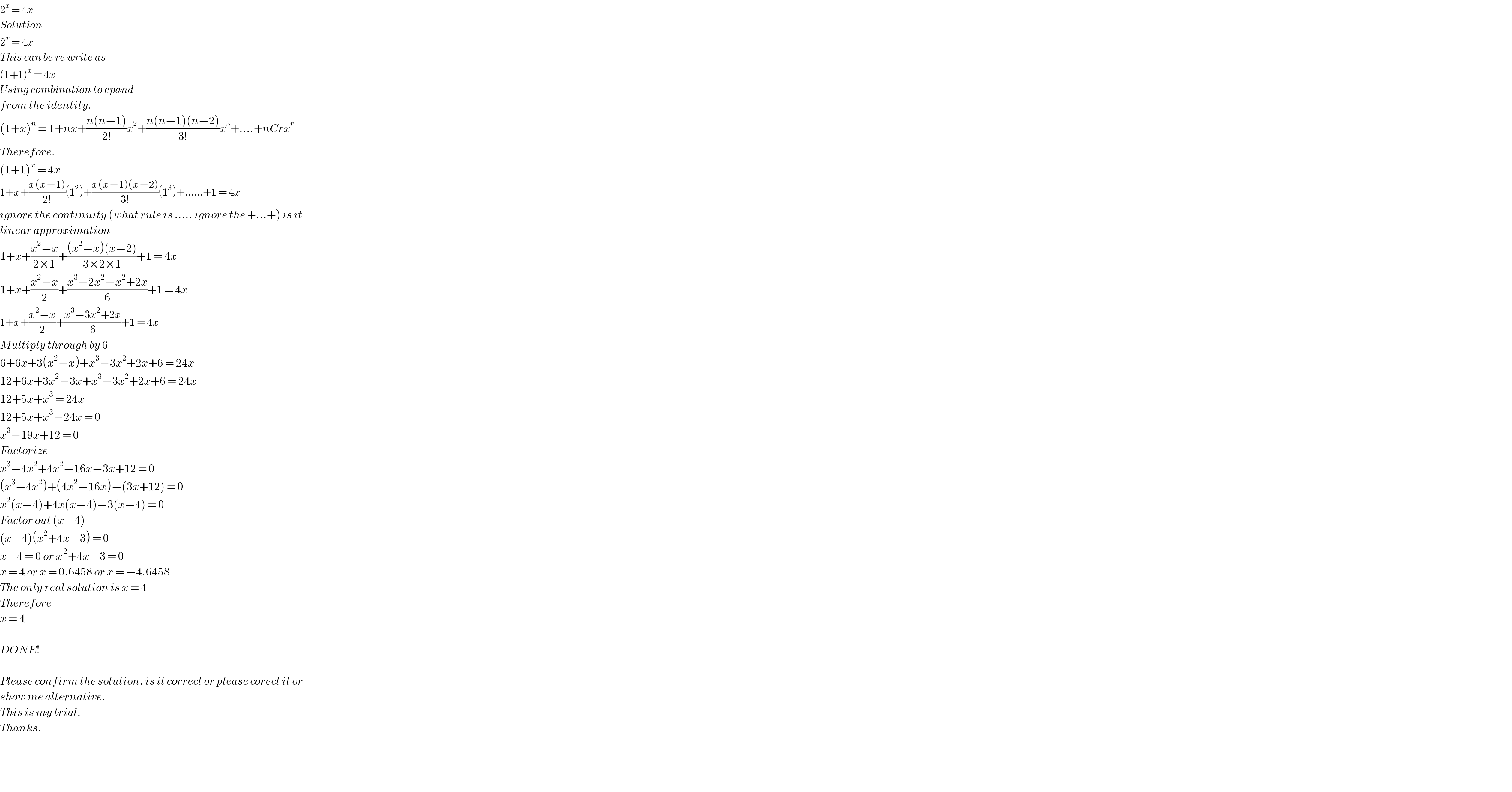
Question Number 5764 by sanusihammed last updated on 26/May/16

$$\mathrm{2}^{{x}} \:=\:\mathrm{4}{x} \\ $$$${Solution} \\ $$$$\mathrm{2}^{{x}} \:=\:\mathrm{4}{x} \\ $$$${This}\:{can}\:{be}\:{re}\:{write}\:{as} \\ $$$$\left(\mathrm{1}+\mathrm{1}\right)^{{x}} \:=\:\mathrm{4}{x} \\ $$$${Using}\:{combination}\:{to}\:{epand} \\ $$$${from}\:{the}\:{identity}. \\ $$$$\left(\mathrm{1}+{x}\right)^{{n}} \:=\:\mathrm{1}+{nx}+\frac{{n}\left({n}−\mathrm{1}\right)}{\mathrm{2}!}{x}^{\mathrm{2}} +\frac{{n}\left({n}−\mathrm{1}\right)\left({n}−\mathrm{2}\right)}{\mathrm{3}!}{x}^{\mathrm{3}} +....+{nCrx}^{{r}\:} \: \\ $$$${Therefore}. \\ $$$$\left(\mathrm{1}+\mathrm{1}\right)^{{x}} \:=\:\mathrm{4}{x} \\ $$$$\mathrm{1}+{x}+\frac{{x}\left({x}−\mathrm{1}\right)}{\mathrm{2}!}\left(\mathrm{1}^{\mathrm{2}} \right)+\frac{{x}\left({x}−\mathrm{1}\right)\left({x}−\mathrm{2}\right)}{\mathrm{3}!}\left(\mathrm{1}^{\mathrm{3}} \right)+......+\mathrm{1}\:=\:\mathrm{4}{x} \\ $$$${ignore}\:{the}\:{continuity}\:\left({what}\:{rule}\:{is}\:.....\:{ignore}\:{the}\:+...+\right)\:{is}\:{it} \\ $$$${linear}\:{approximation} \\ $$$$\mathrm{1}+{x}+\frac{{x}^{\mathrm{2}} −{x}}{\mathrm{2}×\mathrm{1}}+\frac{\left({x}^{\mathrm{2}} −{x}\right)\left({x}−\mathrm{2}\right)}{\mathrm{3}×\mathrm{2}×\mathrm{1}}+\mathrm{1}\:=\:\mathrm{4}{x} \\ $$$$\mathrm{1}+{x}+\frac{{x}^{\mathrm{2}} −{x}}{\mathrm{2}}+\frac{{x}^{\mathrm{3}} −\mathrm{2}{x}^{\mathrm{2}} −{x}^{\mathrm{2}} +\mathrm{2}{x}}{\mathrm{6}}+\mathrm{1}\:=\:\mathrm{4}{x} \\ $$$$\mathrm{1}+{x}+\frac{{x}^{\mathrm{2}} −{x}}{\mathrm{2}}+\frac{{x}^{\mathrm{3}} −\mathrm{3}{x}^{\mathrm{2}} +\mathrm{2}{x}}{\mathrm{6}}+\mathrm{1}\:=\:\mathrm{4}{x} \\ $$$${Multiply}\:{through}\:{by}\:\mathrm{6}\: \\ $$$$\mathrm{6}+\mathrm{6}{x}+\mathrm{3}\left({x}^{\mathrm{2}} −{x}\right)+{x}^{\mathrm{3}} −\mathrm{3}{x}^{\mathrm{2}} +\mathrm{2}{x}+\mathrm{6}\:=\:\mathrm{24}{x} \\ $$$$\mathrm{12}+\mathrm{6}{x}+\mathrm{3}{x}^{\mathrm{2}} −\mathrm{3}{x}+{x}^{\mathrm{3}} −\mathrm{3}{x}^{\mathrm{2}} +\mathrm{2}{x}+\mathrm{6}\:=\:\mathrm{24}{x} \\ $$$$\mathrm{12}+\mathrm{5}{x}+{x}^{\mathrm{3}} \:=\:\mathrm{24}{x} \\ $$$$\mathrm{12}+\mathrm{5}{x}+{x}^{\mathrm{3}} −\mathrm{24}{x}\:=\:\mathrm{0} \\ $$$${x}^{\mathrm{3}} −\mathrm{19}{x}+\mathrm{12}\:=\:\mathrm{0} \\ $$$${Factorize} \\ $$$${x}^{\mathrm{3}} −\mathrm{4}{x}^{\mathrm{2}} +\mathrm{4}{x}^{\mathrm{2}} −\mathrm{16}{x}−\mathrm{3}{x}+\mathrm{12}\:=\:\mathrm{0} \\ $$$$\left({x}^{\mathrm{3}} −\mathrm{4}{x}^{\mathrm{2}} \right)+\left(\mathrm{4}{x}^{\mathrm{2}} −\mathrm{16}{x}\right)−\left(\mathrm{3}{x}+\mathrm{12}\right)\:=\:\mathrm{0} \\ $$$${x}^{\mathrm{2}} \left({x}−\mathrm{4}\right)+\mathrm{4}{x}\left({x}−\mathrm{4}\right)−\mathrm{3}\left({x}−\mathrm{4}\right)\:=\:\mathrm{0} \\ $$$${Factor}\:{out}\:\left({x}−\mathrm{4}\right) \\ $$$$\left({x}−\mathrm{4}\right)\left({x}^{\mathrm{2}} +\mathrm{4}{x}−\mathrm{3}\right)\:=\:\mathrm{0} \\ $$$${x}−\mathrm{4}\:=\:\mathrm{0}\:{or}\:{x}^{\:\mathrm{2}} +\mathrm{4}{x}−\mathrm{3}\:=\:\mathrm{0} \\ $$$${x}\:=\:\mathrm{4}\:{or}\:{x}\:=\:\mathrm{0}.\mathrm{6458}\:{or}\:{x}\:=\:−\mathrm{4}.\mathrm{6458} \\ $$$${The}\:{only}\:{real}\:{solution}\:{is}\:{x}\:=\:\mathrm{4} \\ $$$${Therefore} \\ $$$${x}\:=\:\mathrm{4} \\ $$$$ \\ $$$${DONE}! \\ $$$$ \\ $$$${Please}\:{confirm}\:{the}\:{solution}.\:{is}\:{it}\:{correct}\:{or}\:{please}\:{corect}\:{it}\:{or} \\ $$$${show}\:{me}\:{alternative}. \\ $$$${This}\:{is}\:{my}\:{trial}. \\ $$$${Thanks}. \\ $$$$ \\ $$$$ \\ $$
Commented by prakash jain last updated on 26/May/16

$$\left(\mathrm{1}+{x}\right)^{{n}} =\underset{{i}=\mathrm{0}} {\overset{{n}} {\sum}}\:^{{n}} {C}_{{i}} {x}^{{i}} \:\mathrm{only}\:\mathrm{if}\:{n}\in\mathbb{Z} \\ $$
